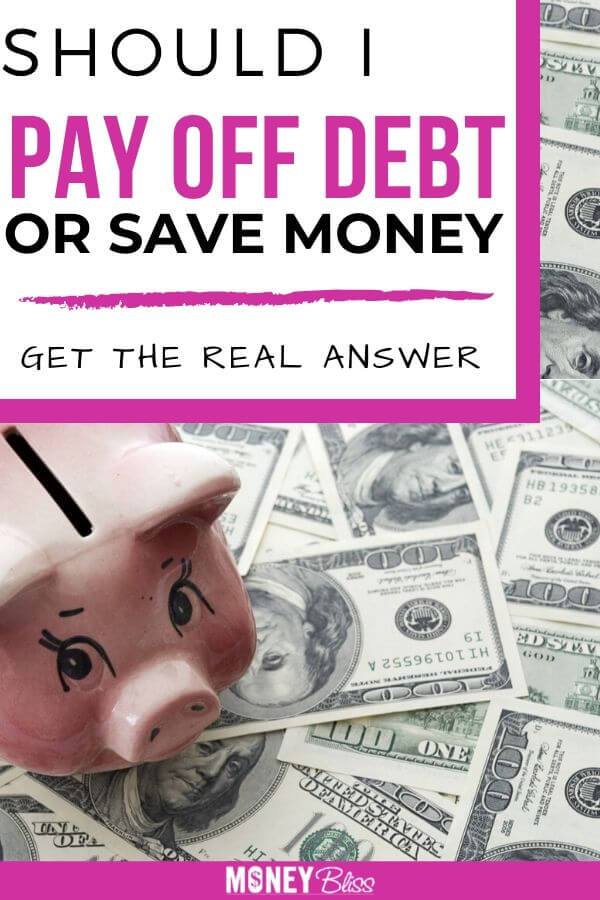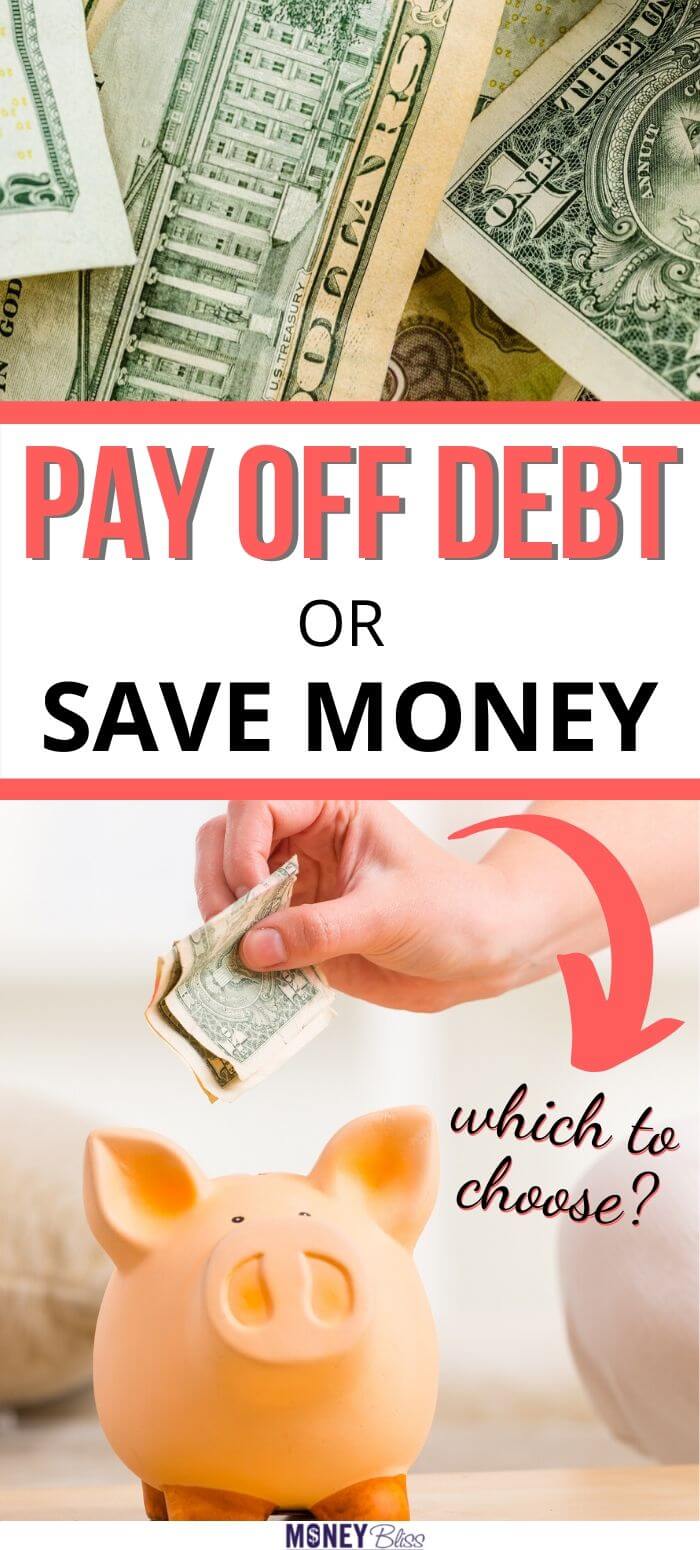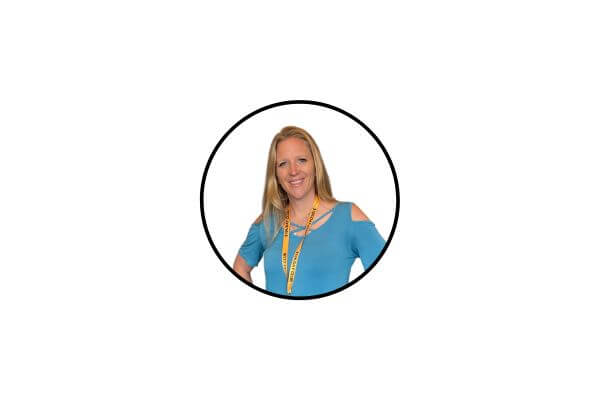Should I Pay Off Debt or Save Money – Yes!
This post may contain affiliate links, which helps us to continue providing relevant content and we receive a small commission at no cost to you. As an Amazon Associate, I earn from qualifying purchases. Please read the full disclosure here.
This is probably one of the top questions I get all the time… Should I pay off debt or save money?
There is a very clear answer on what you should do. We just need to make sure you have a few things in order first.
The one (big) thing we learned before our successful attempt to pay off our debt is we were trying to accomplish everything at once. It was very difficult to make progress on any one thing. We were spread so thin financially. We were trying to save money for rainy day, retirement, college accounts, vacations, you name it as the same time we were attempting to pay off debt.
Honestly, we couldn’t make any progress in finding extra money to pay off our debt – let alone save money.
Then, we switched our mentality for one year and decided to work on just paying off debt. That is when we were finally able to see light at the end of the debt tunnel.
We found success in and finally paid off $53,000 of debt in one year.
So, if you are staring at a pile of debt like we were, then learn how to overcome it and finally pay it off.
But, first you need to make sure you are building a solid foundation with money. (AKA that means saving money)
That is the most important money lesson you can learn is how to build a strong money foundation.
In this post, we will dive into everything you need to know on whether to save money or pay off debt. You will learn exactly when you need to do what. Ultimately, your goal will be to walk away debt free.

Should I Pay Off Debt or Save Money?
Well, that depends… You need to make sure you have a couple of savings accounts in place.
Why?
You don’t want to get caught right back into the debt trap.
That means you need to save money first before you begin the process of paying off debt.
Many times you will hear experts telling you to save money while you are paying off debt. While it is possible, you quickly run out of steam and motivation. It makes me wonder if they get a kickback from the credit card companies.
That is why you must focus on one first and then the next priority or money goal.
To answer the question from above, should I pay off debt or save money, that depends on where you are in your money journey. There is no one-sized fits all answers.
It depends.
Yes, it depends on where you are at and what season of life you are in.
But, don’t fret, here we have created the Money Bliss Steps to Financial Freedom. It is a guide to help you along your journey. Milestones to cross before you aim for the next step.
So, even if our answer seems gray to you, it honestly shouldn’t.
You must have some money saved before you pay off debt.
As you read this post, you will learn the specifics for your personal money situation on whether to save money vs. pay off debt.
How Much Should You Save Before Paying Off Debt?

Before you start attacking your debt, you need to make sure you save money first.
As we stated earlier, you need money set aside for an emergency fund, to pay for medical expenses, and any foreseeable costs in the future.
If we were to add up the numbers, it would look something like this:
- Emergency fund = $1000 or 2% of salary
- Medical expenses = $1000 or deductible
- Foreseeable Expenses = This could be moving expenses, time off work, or new tires.
In this example, the minimum amount that needs to be saved is $2000 before you paid off debt.
When we decided to pay off debt, we had a fully funded emergency fund and one year of medical expenses (plus deductible) in place. That way we could handle any curveballs thrown at us and not totally deter our plans to pay off debt.
Using the numbers from above, how much should you save before paying off debt?
A little later in the post, we will discuss paying off your mortgage debt.
If you don’t have that money set aside, here are some tips to help you:
- How to Save Money Fast – Save $1,000 in a Month
- Quickstart your Emergency Fund Challenge in Less than 60 Days
- 20 Genius Ways on How to Make Money Fast
Should I Use Savings to Pay Off Debt?

Very possibly… yes.
If your savings is more than the amount we need to save before paying off debt, then the answer is yes. That would be the number you figured out above.
Typically, if you have $5000-10,000 or more than that, then yes you should use savings to pay off debt.
Let’s look at an quick example…
You have $25,000 in credit card debt with an interest rate of 23%. Your $20,000 of cash is split evenly between a money market account earning 1.5% and an investment account averaging 6%.
Preferably, you like to make sure you have cash on hand just in case. It is your protection bubble. It makes you “feel” more secure.
In this example, you have negative arbitrage meaning you are paying more in interest than you are earning on your money. Another way to look at it is your cash is going down in value because you are paying more in interest.
In this example, you would make sure you had enough cash available:
- Emergency fund = $1000
- Medical expenses = $3000 deductible
- Foreseeable Expenses = none you can think of
Then, you would leave the $4000 set aside in savings and use the $16000 to pay down your credit card total. This can a debt snowflake (meaning an extra payment). Then, use this calculator to figure out your debt free date.
Just to clarify…Should I empty my savings to pay off credit card?
Yes, in many cases, you need to empty to your savings to pay off your debt. It is one of the ways to pay off debt faster.
If you are paying more in interest than what you are earning in interest, then you need to use savings to pay off debt.
Pay Off Debt or Save Money Examples

Let’s look at a couple of scenarios, then you can see the difference and why you need to base your decision on your personal finance situation.
Pay Off Debt vs Save Money Example #1 –
Joey is living paycheck to paycheck. He doesn’t have any extra money laying around. He hasn’t been able to save. The good news is he isn’t adding any more to his credit card debt or student loans.
Solution – Joey needs to save money for an emergency fund, medical expenses, and any foreseeable expenses. Then, he can start working on getting out of debt.
Also, Joey needs to learn how to stop spending money and as well as make extra money fast.
Pay Off Debt vs Save Money Example #2 –
Monica and Brian have amassed a little saving nest. It is their safety net, but they can’t make any progress on paying down their debt. To date, they have saved $10,000 in cash. But, have his student loans of $35,000 to pay off.
They aren’t sure which way to turn.
Solution – Monica and Brian need to set aside money for an emergency fund and medical expenses. With whatever money is left over, that amount needs to be put towards an extra debt payment.
Also, they need to learn a few frugal living tips and find things to do with no money. Then, they can pay off his student loan debt faster. Only with student loan debt… we recommend to continue retirement savings.
Pay Off Debt vs Save Money Example #3 –
Sarah is a single mom who has been working hard to provide for her and her children. She has her emergency fund in place, but seems to be caught off guard with the expenses for her kids. Thankfully, she isn’t totally living paycheck to paycheck anymore. But, she would like to pay off her debt and have some extra cash in her life.
Solution – Sarah is on the right path. She has an emergency fund in place and part of her medical deductible. She needs to save a little more money before she pays off her debt fast.
Before she begins extra debt payments, she needs to make sinking fund categories for the expenses that catch her off guard.
When to Pay Off Mortgage Debt on a House

This section needs a slightly different answer.
Some people believe you aren’t debt free until you paid off your mortgage. Others believe you are debt free once you don’t have consumer debt (examples: credit cards, car loans, student loan debt, medical debt, or personal loans).
While yes, there are differences. There is one piece that is completely different.
You need a place to live. So, if your mortgage is less than rent payments in your area, then, you have an advantage and your mortgage debt isn’t hurting you. Because you need somewhere to live regardless.
Don’t turn my words though… paying off your mortgage is a HUGE step towards financial freedom. It is something that needs to be done at some point. You just need to make sure you follow the Money Bliss Steps in the right order.
First, you need to pay off all of your consumer debt first. Then, you need to do a little bit more saving. After that point or Money Bliss Step #8 of 10, that is the time you can start to pay off your mortgage debt.
Just to beat the drum one more time… you need a solid foundation of money saved before you pay off your mortgage debt.
Related Reading: 10 Money Bliss Steps to Financial Freedom
Is it Better to Pay Off Debt or Save Money?

In the end, you want to pay off debt. That is the most important step financially you can do to improve your money situation. Also, it helps to break the living paycheck to paycheck cycle.
So yes, it is better to pay off consumer debt instead of saving money.
However, you must make sure you have some money saved up first. That way you aren’t caught off guard and can handle any storms that come your way. Also, there are times you may need to pause debt snowball.
At Money Bliss, we like to teach our readers to focus on one step at a time like climbing a mountain. That way you truly make progress and build a strong foundation to fall back onto.
Now, what is your next step? Do you need help paying off debt? Or saving money before you pay off debt?
Pay Off Debt Resources:
Saving Money Resources:
- Ultimate Guide to a Successful Spending Freeze
- How to Save Money Fast & Save $1,000 in a Month
- 175+ Simple and Easy Frugal Living Tips to Save Money
Just remember… don’t get overwhelmed. You can do this.
Focus on one step at time.

Did the post resonate with you?
More importantly, did I answer the questions you have about this topic? Let me know in the comments if I can help in some other way!
Your comments are not just welcomed; they’re an integral part of our community. Let’s continue the conversation and explore how these ideas align with your journey towards Money Bliss.


